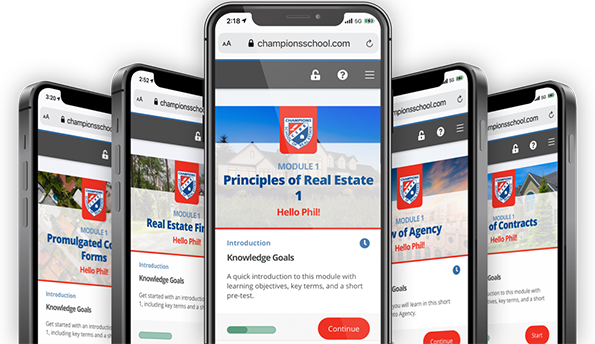
If you're in the market for a new career or looking for the next rung on the ladder, real estate may be a good fit. However, there are many things to consider when weighing the options. It is important to be aware of what you are getting yourself into.
Real estate careers have plenty of perks, but if you want to earn a living, you'll need to put in some work. In addition to learning about the local real estate market, you'll need to learn about how to get your business off the ground. Of course, you will need to make some investments.
To get your license, you will need to register. Most states don't require that you spend much time or money to get your licence. However, you will need to take a few classes. Some states offer correspondence course. Some states offer correspondence courses. Others require you to take a class. Most importantly, it will take you around 60 hours to earn your real estate licensing.

Real estate is highly competitive. Therefore, it's important to be able show potential clients your skills. To build your listing pipeline, you will need to establish a strong network of contacts. In addition, fees are required to join the Multiple Listing Service (or your local realtor association) and to other organizations.
Consider your personal preferences and your time commitment before deciding if investing in real estate is for your needs. Sometimes you will have to travel outside your home in order to meet clients. You might also have to give up weekends to show properties. However, if your ability to deal with the challenge is there, you might be able enjoy the perks and perks of being your own boss.
However, there is no guarantee that you will succeed. Aside from the usual obstacles like finding a mentor, you'll need to learn the ins and outs of your industry. You will also need the ability to negotiate. Real estate agents are responsible for clients' needs and may also be required to pay a commission.
As a matter of fact, you may find that selling a home is a difficult and stressful endeavor. There are many ways to make it easier. One option is to invest in more reserve funds. You'll be able to reduce the stress associated with variable pay structures.

There are a few things you can do to make your brand stand out from the rest. For instance, you might need to think outside the box when it comes to marketing your services. Not all agents have the same background, so you'll have to be a little more creative. It's a smart idea to make friends and build a family network. Referring can make a big difference.
You must be self-motivated. This is especially important if your earnings are not what you had hoped for. Be sure to set aside a little extra money for retirement, as you'll likely be working for several years to come.
FAQ
How can I tell if my house has value?
Your home may not be priced correctly if your asking price is too low. You may not get enough interest in the home if your asking price is lower than the market value. You can use our free Home Value Report to learn more about the current market conditions.
What should you think about when investing in real property?
The first thing to do is ensure you have enough money to invest in real estate. You will need to borrow money from a bank if you don’t have enough cash. Also, you need to make sure you don't get into debt. If you default on the loan, you won't be able to repay it.
You also need to make sure that you know how much you can spend on an investment property each month. This amount must include all expenses associated with owning the property such as mortgage payments, insurance, maintenance, and taxes.
You must also ensure that your investment property is secure. You would be better off if you moved to another area while looking at properties.
How much money do I need to save before buying a home?
It all depends on how many years you plan to remain there. If you want to stay for at least five years, you must start saving now. However, if you're planning on moving within two years, you don’t need to worry.
What can I do to fix my roof?
Roofs can become leaky due to wear and tear, weather conditions, or improper maintenance. Repairs and replacements of minor nature can be made by roofing contractors. Contact us to find out more.
How do I get rid termites & other pests from my home?
Termites and other pests will eat away at your home over time. They can cause serious destruction to wooden structures like decks and furniture. This can be prevented by having a professional pest controller inspect your home.
Should I use a mortgage broker?
A mortgage broker may be able to help you get a lower rate. Brokers are able to work with multiple lenders and help you negotiate the best rate. Brokers may receive commissions from lenders. Before you sign up for a broker, make sure to check all fees.
What are the advantages of a fixed rate mortgage?
Fixed-rate mortgages allow you to lock in the interest rate throughout the loan's term. This means that you won't have to worry about rising rates. Fixed-rate loans also come with lower payments because they're locked in for a set term.
Statistics
- This seems to be a more popular trend as the U.S. Census Bureau reports the homeownership rate was around 65% last year. (fortunebuilders.com)
- It's possible to get approved for an FHA loan with a credit score as low as 580 and a down payment of 3.5% or a credit score as low as 500 and a 10% down payment.5 Specialty mortgage loans are loans that don't fit into the conventional or FHA loan categories. (investopedia.com)
- 10 years ago, homeownership was nearly 70%. (fortunebuilders.com)
- Private mortgage insurance may be required for conventional loans when the borrower puts less than 20% down.4 FHA loans are mortgage loans issued by private lenders and backed by the federal government. (investopedia.com)
- The FHA sets its desirable debt-to-income ratio at 43%. (fortunebuilders.com)
External Links
How To
How to Manage A Rental Property
It can be a great way for you to make extra income, but there are many things to consider before you rent your house. We'll show you what to consider when deciding whether to rent your home and give you tips on managing a rental property.
Here are some things you should know if you're thinking of renting your house.
-
What do I need to consider first? Before you decide if your house should be rented out, you need to examine your finances. If you have any debts such as credit card or mortgage bills, you might not be able pay for someone to live in the home while you are away. Also, you should review your budget to see if there is enough money to pay your monthly expenses (rent and utilities, insurance, etc. You might find it not worth it.
-
How much does it cost for me to rent my house? The cost of renting your home depends on many factors. These factors include location, size, condition, features, season, and so forth. Prices vary depending on where you live so it's important that you don't expect the same rates everywhere. The average market price for renting a one-bedroom flat in London is PS1,400 per month, according to Rightmove. This would translate into a total of PS2,800 per calendar year if you rented your entire home. It's not bad but if your property is only let out part-time, it could be significantly lower.
-
Is it worthwhile? Doing something new always comes with risks, but if it brings in extra income, why wouldn't you try it? Be sure to fully understand what you are signing before you sign anything. Renting your home won't just mean spending more time away from your family; you'll also need to keep up with maintenance costs, pay for repairs and keep the place clean. Before you sign up, make sure to thoroughly consider all of these points.
-
Is there any benefit? So now that you know how much it costs to rent out your home and you're confident that it's worth it, you'll need to think about the advantages. There are plenty of reasons to rent out your home: you could use the money to pay off debt, invest in a holiday, save for a rainy day, or simply enjoy having a break from your everyday life. No matter what your choice, renting is likely to be more rewarding than working every single day. If you plan well, renting could become a full-time occupation.
-
How do I find tenants? Once you've made the decision that you want your property to be rented out, you must advertise it correctly. Make sure to list your property online via websites such as Rightmove. Once potential tenants reach out to you, schedule an interview. This will allow you to assess their suitability, and make sure they are financially sound enough to move into your house.
-
How can I make sure I'm covered? If you're worried about leaving your home empty, you'll need to ensure you're fully protected against damage, theft, or fire. You'll need to insure your home, which you can do either through your landlord or directly with an insurer. Your landlord may require that you add them to your additional insured. This will cover any damage to your home while you are not there. This doesn't apply to if you live abroad or if the landlord isn’t registered with UK insurances. You will need to register with an International Insurer in this instance.
-
You might feel like you can't afford to spend all day looking for tenants, especially if you work outside the home. However, it is important that you advertise your property in the best way possible. Make sure you have a professional looking website. Also, make sure to post your ads online. Additionally, you'll need to fill out an application and provide references. Some people prefer to do the job themselves. Others prefer to hire agents that can help. You'll need to be ready to answer questions during interviews.
-
What should I do once I've found my tenant? If there is a lease, you will need to inform the tenant about any changes such as moving dates. If you don't have a lease, you can negotiate length of stay, deposit, or other details. You should remember that although you may be paid after the tenancy ends, you still need money for utilities.
-
How do I collect rent? When it comes to collecting the rent, you will need to confirm that the tenant has made their payments. You will need to remind your tenant of their obligations if they don't pay. Before you send them a final invoice, you can deduct any outstanding rent payments. If you're struggling to get hold of your tenant, you can always call the police. The police won't ordinarily evict unless there's been breach of contract. If necessary, they may issue a warrant.
-
How can I avoid problems? It can be very lucrative to rent out your home, but it is important to protect yourself. Install smoke alarms, carbon monoxide detectors, and security cameras. Also, make sure you check with your neighbors to see if they allow you to leave your home unlocked at night. You also need adequate insurance. You should never allow strangers into your home, no matter how they claim to be moving in.